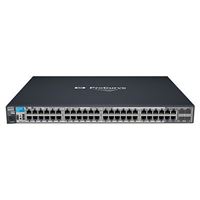132 -- -- -- -- 131 

HPE PROCURVE SWITCH AL 2910al-48G 2x OPEN SLOT more
HPE PROCURVE SWITCH AL 2910al-48G 2x OPEN SLOT
The HP E2910 al Switch Series consists of four switches: the HP E2910-24G al and HP E2910-24G-PoE+ al Switches with 24 10/100/1000 ports, and the HP E2910-48G al and HP E2910-48G-PoE+ al Switches with 48 10/100/1000 ports. Each switch has four dual-personality ports for 10/100/1000 or mini-GBIC connectivity. In addition, the E2910 al Switch series supports up to four optional 10-Gigabit (CX4 and/or SFP+) ports, thereby offering the most flexible and easy-to-deploy uplinks in its class. Together with static and RIP IPv4 routing, robust security and management, enterprise-class features, free lifetime warranty, and free software updates, the 2910 series is a cost-effective, scalable solution for customers who are building high-performance networks. These switches can be deployed at enterprise edge and remote branch offices, converged networks, and data center top of rack.
Performance
• High-performance architecture: 128 Gbps switching fabric with up to 95 million pps (24-port switches) and 176 Gbps switching fabric with up to 131 million pps (48-port switches).
Resiliency and high availability
• IEEE 802.1s Multiple Spanning Tree: provides high link availability in multiple VLAN environments by allowing multiple spanning trees; provides legacy support for IEEE 802.1d and IEEE 802.1w.
Connectivity
• 10 Gbps Ethernet connectivity: Up to four optional and flexible 10-Gigabit ports (CX4 and/or SFP+)--with optional interconnect kit for short-distance connectivity.
Layer 2 switching
• VLAN support and tagging: supports the IEEE 802.1Q (4,094 VLAN IDs) and 256 VLANs simultaneously.
Layer 3 routing
• Static IP routing: provides manually configured routing; includes ECMP capability.
Quality of Service
• Traffic prioritization (IEEE 802.1p): allows real-time traffic classification into eight priority levels mapped to eight queues.
Security
• Multiple user authentication methods: IEEE 802.1X: industry-standard method of user authentication using an IEEE 802.1X supplicant on the client in conjunction with a RADIUS server; Web-based authentication: similar to IEEE 802.1X, provides a browser-based environment to authenticate clients that do not support the IEEE 802.1X supplicant.
The HP E2910 al Switch Series consists of four switches: the HP E2910-24G al and HP E2910-24G-PoE+ al Switches with 24 10/100/1000 ports, and the HP E2910-48G al and HP E2910-48G-PoE+ al Switches with 48 10/100/1000 ports. Each switch has four dual-personality ports for 10/100/1000 or mini-GBIC connectivity. In addition, the E2910 al Switch series supports up to four optional 10-Gigabit (CX4 and/or SFP+) ports, thereby offering the most flexible and easy-to-deploy uplinks in its class. Together with static and RIP IPv4 routing, robust security and management, enterprise-class features, free lifetime warranty, and free software updates, the 2910 series is a cost-effective, scalable solution for customers who are building high-performance networks. These switches can be deployed at enterprise edge and remote branch offices, converged networks, and data center top of rack.
Performance
• High-performance architecture: 128 Gbps switching fabric with up to 95 million pps (24-port switches) and 176 Gbps switching fabric with up to 131 million pps (48-port switches).
Resiliency and high availability
• IEEE 802.1s Multiple Spanning Tree: provides high link availability in multiple VLAN environments by allowing multiple spanning trees; provides legacy support for IEEE 802.1d and IEEE 802.1w.
Connectivity
• 10 Gbps Ethernet connectivity: Up to four optional and flexible 10-Gigabit ports (CX4 and/or SFP+)--with optional interconnect kit for short-distance connectivity.
Layer 2 switching
• VLAN support and tagging: supports the IEEE 802.1Q (4,094 VLAN IDs) and 256 VLANs simultaneously.
Layer 3 routing
• Static IP routing: provides manually configured routing; includes ECMP capability.
Quality of Service
• Traffic prioritization (IEEE 802.1p): allows real-time traffic classification into eight priority levels mapped to eight queues.
Security
• Multiple user authentication methods: IEEE 802.1X: industry-standard method of user authentication using an IEEE 802.1X supplicant on the client in conjunction with a RADIUS server; Web-based authentication: similar to IEEE 802.1X, provides a browser-based environment to authenticate clients that do not support the IEEE 802.1X supplicant.
| Name | Hewlett Packard Enterprise |
| Street | Herrenberger Str. 140 |
| Zip code | 71034 |
| City | Böblingen |
| Phone | +49 69 153253561 |
| E-mail/Contact form | enterprise.kunden@hpe.com |
| Website | www.hpe.de |






